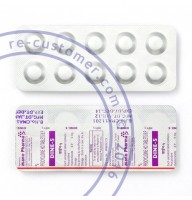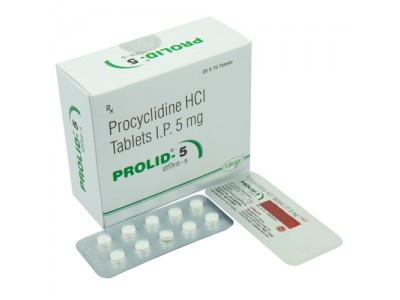Understanding Procyclidine and Antipsychotic Medications
Procyclidine is a medication primarily used to treat symptoms of Parkinson's disease and other movement disorders. It works by reducing the effects of certain chemicals in the brain that cause these symptoms. However, when it comes to taking procyclidine with antipsychotic medications, there are several important considerations to keep in mind. This article delves into the safety, interactions, and guidelines for using procyclidine alongside antipsychotic drugs.
Can Procyclidine Be Taken with Antipsychotic Drugs?
Procyclidine and antipsychotic medications can interact in ways that may affect your overall treatment plan. Antipsychotics are used to manage conditions like schizophrenia and bipolar disorder, and they often work by altering the balance of neurotransmitters in the brain. Procyclidine, on the other hand, primarily affects acetylcholine levels.
When combining these medications, it's crucial to understand their potential interactions. Some antipsychotics can exacerbate side effects caused by procyclidine, while procyclidine might influence the effectiveness of the antipsychotic drugs. Therefore, consulting with a healthcare provider before starting or adjusting any medications is essential.
Procyclidine 5mg with Antipsychotic Safety
The safety of using procyclidine 5mg with antipsychotic medications depends on various factors, including the specific antipsychotic used and the individual's health condition. Procyclidine is known to sometimes cause drowsiness, dizziness, and blurred vision, which can be intensified when taken with certain antipsychotic drugs. Additionally, some antipsychotics may cause side effects that overlap with those of procyclidine, such as dry mouth or constipation.
To ensure safety, it is important to monitor for any adverse reactions and adjust dosages as needed under the guidance of a healthcare provider. Regular check-ups and communication with your doctor can help manage these risks effectively.
Mixing Procyclidine with Antipsychotic Medication
Mixing procyclidine with antipsychotic medications requires careful consideration. The interaction between these drugs can be complex, and the effects can vary based on the specific antipsychotic being used. Some combinations may lead to an increased risk of side effects, while others may have a diminished therapeutic effect.
It is crucial to discuss any plans to combine these medications with your healthcare provider. They can provide personalized advice based on your medical history and current health condition. They may also suggest alternative treatments or adjustments to avoid potential interactions.
Procyclidine Antipsychotic Medicine Guidelines
When taking procyclidine with antipsychotic medications, following specific guidelines can help minimize risks. These guidelines include starting with the lowest possible dose of each medication and gradually adjusting as needed. It is also important to monitor for any signs of adverse reactions and report them to your healthcare provider.
Regular monitoring and communication with your healthcare provider are key to managing the combination of procyclidine and antipsychotic medications safely. Your provider may also recommend periodic blood tests or other assessments to ensure the effectiveness and safety of your treatment regimen.
Procyclidine and Antipsychotic Medication Side Effects
Both procyclidine and antipsychotic medications have their own set of potential side effects. Procyclidine can cause dizziness, blurred vision, and drowsiness, while antipsychotics may lead to weight gain, metabolic changes, and movement disorders. When taken together, these side effects can be amplified.
It is important to be aware of these potential side effects and discuss them with your healthcare provider. They can help you balance the benefits of the medication with the risks and provide guidance on managing any adverse effects.
Safety of Procyclidine with Antipsychotics
Ensuring the safety of using procyclidine with antipsychotic medications involves careful management and regular medical oversight. Both medications have the potential to interact and affect each other’s effectiveness and side effect profile, so it is essential to follow medical advice and report any unusual symptoms promptly.
By working closely with your healthcare provider and adhering to prescribed guidelines, you can optimize your treatment while minimizing risks. Always prioritize open communication and regular check-ins to maintain the safety and effectiveness of your medication regimen.
Procyclidine Use with Antipsychotic Treatments
Procyclidine use in combination with antipsychotic treatments can be beneficial for managing specific symptoms, but it requires careful planning and supervision. Your healthcare provider will tailor your treatment plan to meet your individual needs and help manage any potential interactions.
Effective treatment involves a balance between managing symptoms and minimizing side effects. Your provider’s guidance is crucial in achieving this balance and ensuring that your treatment remains both safe and effective.
Antipsychotic Drugs and Procyclidine Compatibility
Compatibility between antipsychotic drugs and procyclidine varies depending on the specific medications involved. Some combinations are more likely to lead to interactions, while others may be more compatible. It is essential to work with your healthcare provider to determine the best approach for your specific situation.
Personalized medical advice is key to navigating the complexities of combining procyclidine with antipsychotic medications. Your provider can help you understand the potential interactions and make informed decisions about your treatment plan.
In conclusion, the combination of procyclidine with antipsychotic medications requires careful consideration and management. By following medical guidelines and maintaining open communication with your healthcare provider, you can optimize your treatment and manage any potential risks effectively.

